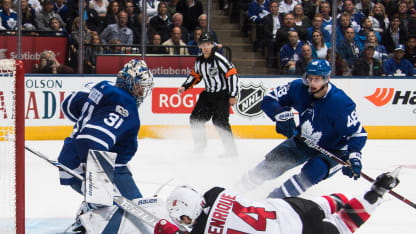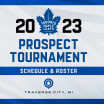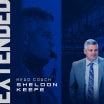Coming off their first loss of the 2017-18 regular season, the Maple Leafs prepared for a visit to Montreal Saturday to take on the arch-rival Canadiens at Bell Centre. And one way they know they can help get back on the winning track is to reduce the number of visits to the penalty box they've been taking thus far.
Leafs prepare for Canadiens, aim to cut down penalty count

© Mark Blinch
By
Adam Proteau Proteautype / MapleLeafs.com
This isn't an issue limited just to the Leafs; as the NHL continues to emphasize their changed standard in regard to a couple of key rules - the slashing and faceoff violation minor penalties - all teams have had to adjust. That said, Toronto has been one of the most penalized clubs through its first handful of games, and in a league in which special teams often are the difference between winning and losing, cutting down on their number of penalty kills is a high priority for head coach Mike Babcock and his players.
Indeed, Babcock was making no excuses for the Leafs, who on Friday sat tied for third in the NHL with 21 minor penalties in their first four games.
"When you look at the most penalized team in the National Hockey League, St. Louis (with 23) has more minors, but they've played one more game than us - we're leading the charge," Babcock said after practice Friday. "So the message being sent isn't being received. We've got to fix it. So we're going to fix it."
Nine of Toronto's minor penalties this year have been slashing calls - one in each of their first two games, four against the New York Rangers, and three in Wednesday's 6-3 loss to New Jersey - and although some were of the highly questionable variety, the impetus behind the crackdown on slashing is one that has the game's best interests at heart: too often in recent seasons, players have hacked and whacked away at their opponents' hands, either causing injury or breaking up skilled plays.
So it's understandable why the league and the NHL Players' Association would want to address that issue. But when it's resulting in too many trips to the box, it's something players have to focus on improving at sooner than later.
"Definitely, there's a lot of adjusting going on," said winger Patrick Marleau. "I think it's been an instinct a lot of players have. I don't know that you're necessarily going after the hands - you're going after the stick just to try and let them know, 'I'm here, I'm coming to get you' kinda thing. But when it does get up on the hands, it seems that's when they'll be calling it."
"Just defining having a consistent standard is something I think is still a work-in-progress," added winger James van Riemsdyk. "Once we as players feel out that process of what's going to be called and what isn't going to be called, then I think it helps you to play certain situations a certain way. Having to play one way for a certain amount of time and now it's drastically different, it certainly changes things. It's just something players and officials with get more comfortable with as the years go on."
van Riemsdyk was one of those three Leafs called for slashing in Wednesday's tilt against New Jersey. And if you go back and examine the video of the sequence that resulted in him going to the penalty box, his slash doesn't appear especially egregious. But the genesis behind the crackdown - giving skilled players more space and ability to generate offensive opportunities with the puck - is one van Riemsdyk agrees with wholeheartedly.
"I love the idea," van Riemsdyk said. "I think it's great. A lot of times, you see how hard it is to carry the puck through the neutral zone when you have a 'D' closing you off, and (an opponent) backtracking you, and the guy's whacking you only a little bit on the hands. I got one last game - I had one hand on my stick and I thought I barely even touched him. But I mean, it's good if that's the standard we're going to hold it to, and it lets that guy carrying the puck make a play versus always having to dump it in or chip it in, I think that creates more offence and creates a more exciting product on the ice."
Babcock certainly wants the Leafs to improve their discipline, but after a flat effort against a young Devils team snapped Toronto's three-game win streak, he's just as focused on the Buds bringing a vastly improved work ethic to Montreal and a Canadiens team that has won 14 consecutive regular-season games against the Buds.
"We didn't work, and that's on me - I didn't have the team prepared and ready to go," Babcock said of Toronto's performance against New Jersey. "We were no good in the morning skate. I could've zipped 'em, (but) no matter what we said, they didn't get prepared to engage at a high enough level. We got out-chanced 7-3 in the first, and that's totally unacceptable, and then we got out-skated and we had no battle level.
"To me, you're four games into your season, that can't happen. The other look is, 'Hey Babs, lighten up, we're 3-1 (in the standings).' No. You come to work every day, you be a good pro and you prepare to be a good pro, and things go your way. The league's too hard to take nights off. We did."


















